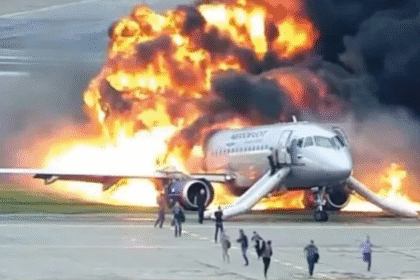10 Years After Kurla Hotel Fire, Bombay HC Orders BMC to Pay ₹50 Lakh Compensation to Each Victim
The Bombay High Court on Tuesday, June 10, directed the Brihanmumbai Municipal Corporation (BMC) to pay ₹50 lakh each as compensation to the kin of eight victims of a hotel fire incident in Kurla or Mumbai. All eight victims died in a fire in Hotel City Kinara in 2015.
As many as eight persons were killed when a fire broke out inside the Kurla hotel on October 16, 2015. Seven of them were students aged 18-20, and the eighth victim was a 31-year-old design engineer from Virar.
The high court was hearing petitions filed by parents of the victims seeking to quash the Lokayukta’s February 2017 order, which dismissed their complaint seeking a probe. The Lokayukta, while dismissing their pleas, noted that compensation of ₹1 lakh each was disbursed.
The families sought the enhancement of the compensation amount.
Citing its gross failure in the discharge of its duties, the high court ordered the civic body to pay ₹50 lakh each to the families of the victims within 12 weeks.
“Due to the failure of the BMC in taking action, the illegality in Kinara continued unabated and ultimately led to the fire and the loss of life,” a bench of Justices B P Colabawalla and Firdosh Pooniwalla said.
The court remarked it was “shocking” that the BMC took no action against the hotel, even though it was aware the establishment lacked the necessary fire department approvals. “Had the BMC taken prompt action, then the fire incident would not have definitely not occurred,” the court noted.
The negligence and breach of statutory duties by the BMC is a proximate cause of the fire, and the civic body can be held vicariously liable for the acts of commission and omission of its officials.”
“This violation of the fundamental rights of the petitioners and their kin under Article 21 of the Constitution of India has been caused as a direct result of the negligence and breach of statutory duties on the part of BMC,” the court said.
The court also noted a list of violations on part of the hotel, saying it operated a service area on the mezzanine floor, which was supposed to be a storage area and also did not have a no-objection certificate (NOC) from the fire department.
Kinara was granted an eating housing licence without obtaining any fire NOC from the fire department, the court said. The hotel had also stored several gas cylinders which was prohibited.
“This, in our view, was one of the most egregious breaches committed not only by the owner and operator of Kinara but also by Respondent No.2 by issuing an eating house licence to Kinara without obtaining any fire NOC,” it observed.
Justice After a Decade: Bombay HC’s Landmark Verdict on the Kurla Hotel Fire
A decade after the devastating Kurla hotel fire that claimed multiple lives and left several injured, justice has finally taken a meaningful turn. The Bombay High Court, in a powerful verdict that resonates with accountability and empathy, has directed the Brihanmumbai Municipal Corporation (BMC) to pay ₹50 lakh in compensation to each of the fire victims’ families.
This landmark judgment is more than just a financial payout—it is a long-delayed acknowledgment of institutional failure and a critical step toward systemic change. Here’s a deep dive into the case, its implications, and why this ruling could redefine urban safety standards and governance in Mumbai and beyond.
What Happened in the 2014 Kurla Hotel Fire?
In December 2014, a fire broke out in a Kurla-based hotel in Mumbai’s eastern suburbs. The blaze, reportedly caused by negligence in fire safety protocols, spread rapidly, engulfing the structure and leaving multiple people dead and others with serious injuries.
Eyewitness accounts and subsequent investigations revealed several troubling factors:
- The hotel lacked proper fire exits and ventilation.
- No fire compliance certificate was available at the time.
- Rescue operations were delayed due to narrow access lanes and blocked passages.
- Most tragically, emergency response teams were under-equipped to handle the situation.
The aftermath left families grieving and seeking justice in a system notorious for delays.
Legal Battle: A Fight for Accountability
For the victims’ families, the past 10 years have been a painful journey—of loss, litigation, and waiting. Despite multiple complaints and inquiries, no substantial compensation had been paid for years.
Finally, the matter reached the Bombay High Court, where the victims’ families demanded justice in the form of:
- Official acknowledgment of BMC’s negligence.
- A court-mandated compensation amount.
- Concrete steps to prevent such tragedies in the future.
The court, after examining the evidence and holding BMC accountable for failure to enforce fire safety norms, delivered a historic verdict.
The Verdict: ₹50 Lakh Compensation Per Victim
In a judgment that is now being hailed as a milestone in civic responsibility, the Bombay High Court has:
- Directed the BMC to pay ₹50 lakh to each victim’s family.
- Noted gross negligence on the part of civic authorities in failing to inspect, regulate, and enforce safety compliance.
- Stated that this compensation is not a “favor” but a legal and moral obligation.
This ruling serves as a clear message that municipal bodies cannot ignore public safety, and that government accountability is not optional—it is essential.
Why This Case Matters: Precedent for Urban Safety and Civic Accountability
While Mumbai has seen numerous fire incidents over the years—from Kamala Mills to Byculla hospital—what sets the Kurla fire case apart is the judicial recognition of systemic failure and the imposition of a financial penalty on the civic body.
Key implications of this verdict:
- Sets a legal precedent for future negligence-related compensation claims.
- Reinforces the importance of regular fire safety audits in public and private spaces.
- Pressures municipal bodies like the BMC to prioritize enforcement over paperwork.
- Puts victims’ rights and dignity at the forefront of urban governance.
This is not just a win for the victims’ families—it is a wake-up call for city planners, builders, and policymakers.
The Bigger Picture: Mumbai’s Fire Safety Crisis
Mumbai, as a densely populated urban hub, faces a continuous risk of fires—especially in older buildings, unauthorized structures, and informal settlements. According to data:
- Over 48,000 fire incidents were reported in Mumbai in the last 10 years.
- Many establishments still lack functioning fire alarms or extinguishers.
- Shortcuts in building compliance are commonplace due to corrupt approvals or bureaucratic negligence.
This ruling comes at a time when residents are increasingly questioning the reliability of their civic systems. It reaffirms the idea that urban development cannot come at the cost of human lives.
Voices from the Ground: Families React to the Judgment
For families who lost loved ones in the Kurla fire, the court’s decision is both a relief and a reminder.
“We lost our son ten years ago. No amount of money can replace him, but this verdict tells us that his death was not in vain,” said one family member, tearfully.
“We want the government to now ensure that no other family has to suffer like we did,” added another.
The emotional weight behind the verdict highlights that justice delayed is painful, but justice delivered—even late—can still bring closure.
What the BMC Must Do Now
The court has given the BMC a binding obligation—but its responsibility doesn’t end with cutting cheques.
To restore public trust and ensure lasting change, the BMC must:
- Create a citywide audit of fire compliance in all commercial and residential buildings.
- Publish a public list of fire-code violators.
- Set up a fire safety task force with a 24×7 response system.
- Introduce real-time digital inspection records to prevent future cover-ups.
- Conduct monthly drills and awareness programs for public institutions and residential societies.
Conclusion: A Step Toward Safer Cities
The Bombay High Court’s ₹50 lakh compensation order in the Kurla hotel fire case is a moment of reckoning—not just for BMC, but for all Indian cities struggling with unregulated growth and fragile infrastructure.
This judgment is not just about one tragedy. It’s about the idea that every citizen deserves to feel safe, and every public institution has a duty to protect that right. The court’s message is loud and clear: lives lost due to negligence will not be forgotten, and those responsible will be held accountable.
Now, it’s time for civic bodies to walk the talk. Because in the end, justice isn’t just about compensation—it’s about prevention.








